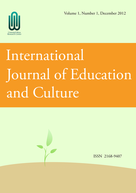


Volume 12 Issues 3-4 (2023-12-31)
Volume 12 Issues 1-2 (2023-06-30)
Volume 10 Issues 1&2 (2021-06-30)
Volume 9 Issues 3&4 (2020-12-31)
Volume 9 Issues 1&2 (2020-06-30)
Volume 8 Issues 3&4 (2019-12-31)
Volume 8 Issues 1&2 (2019-06-30)
Volume 7 Issues 3&4 (2018-12-31)
Volume 7 Issues 1&2 (2018-06-30)
Volume 6 Issues 3&4 (2017-12-31)
Volume 6 Issues 1&2 (2017-06-30)
Volume 5 Issues 3&4 (2016-12-31)
Volume 5 Issues 1&2 (2016-06-30)
Volume 4 Issues 3&4 (2015-12-31)
This study examined the degree to which factors of academic self-efficacy, acculturation, academic motivation, and life satisfaction impact community college English learners’ academic success. A sample of 118 English learners who were enrolled in an urban community college in the U.S. participated in the study. Results indicated that second language community college students had strong academic self-efficacy, however, they lack the skills to engage actively in class. In addition, students perceived that they were accepted in the community college environment and experienced little identity and cultural conflicts. The findings from this study provide information on how second language community college students perceive this educational setting.
Online education with information and communication technologies (ICT) has become a major phenomenon around the world. In America, for example, there are hundreds of online colleges and universities and thousands of online courses available to students. Most American universities offer at least some courses online, and many universities have fully developed online degree programmes at both undergraduate and graduate levels. This article reviews online education with ICT in American higher education. First, it describes the nature of using ICT in online education. Second, it examines the benefits of using ICT in online education. Third, it discusses the challenges of using ICT in online teaching and learning. Fourth, it proposes the leadership and policy implications for higher education leaders and administrators as well as practical implications for professors to be successful online instructors and students to be effective online learners. Finally, it identifies research gaps and proposes directions for future research.
The origin of the school counselor’s role is rooted in vocational guidance. In one way, this reinforces the “goodness of fit” for school counselors to have a central role in career and college readiness planning or initiatives across the primary and secondary levels. When the role of the school counselor was first created in the mid-1950’s, it was called a “Vocational Guidance Counselor” and focused on postsecondary planning advice for the high school aged students. In the early 1980’s the title of this role was formally changed to “Professional School Counselor” (commonly referred to as School Counselor) by the American School Counselors Association. While some states will still refer to their school counselors as “guidance” counselors, the role has become integral to effectively meeting the developmental needs of the students throughout primary and secondary school. The specific field of School Counseling became an independent role in the schools in the late 1950’s. This field’s history includes several twists and turns, with origins stemming from career and vocational lenses. The field and this critical role in the school has continuously changed so that the effect in today’s schools seems to contribute to the School Counseling field being more convoluted than it needs to be. This paper attempts to “de-tangle” the history of the School Counseling field to provide clarification of the role as well as the critical need for advocacy in the present. It also assists with understanding why individuals within the educational system as well as outside of it, may have confusion of the 21st century School Counselor’s role.
CALL FOR PAPERS/PROPOSALS
CALL FOR BOOK EDITORS